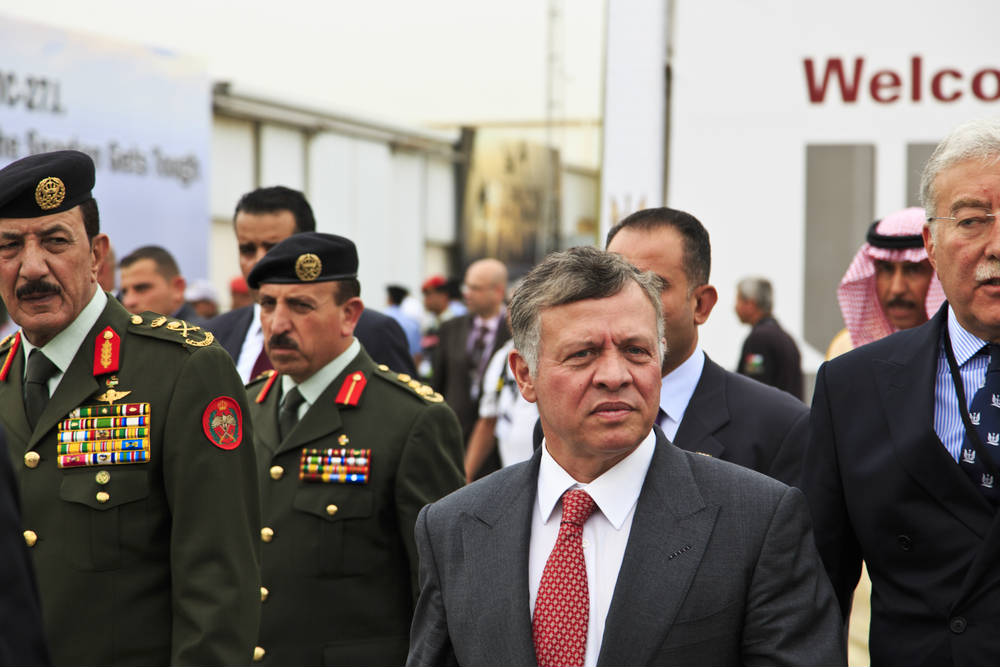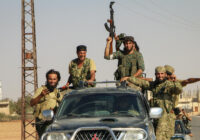The key to fighting the Islamic State is economic stability and jobs for young people.
Thousands of Jordanians, including Queen Rania, took to the streets of Amman on February 6. They were protesting the burning alive of Jordanian fighter pilot Muath al-Kasasbeh by the Islamic State (IS) and showing their support for the Jordanian government’s vow to “eliminate them and wipe them [IS] out completely.”
Does such a massive outpouring of public anger mark a shift in the popular mood in Jordan? Could this mean that the Islamic State is losing support in the Middle East?
In order to answer these questions, it’s essential to look at the economic conditions that Jordanians — especially the youth — are living in.
Economic Stress
Jordan is a country of 6.5 million people that suffers from high levels of unemployment affecting a quarter of its working age population. The unemployment rate among young people has reached a massive 30%. And 60% of Jordanians are under 30 years old.
The Jordanian economy took a serious hit in the immediate aftermath of the Arab Uprisings of 2011. Tourism and remittances, the main sources of the country’s income, declined by 16% and 4.2% respectively in late 2011. Previously, remittances had represented up to 20% of gross domestic product (GDP) — depending on the year — while tourism constituted 14% of GDP and 6% of the labor force.
The military conflicts in neighboring Iraq and Syria have also seriously impacted Jordan with major influxes of refugees, first from Iraq (between 700,000 and 1 million) and more recently Syria (500,000-750,000).
While all registered Syrian refugees receive assistance from the United Nations High Commissioner for Refugees (UNHCR), a recent report from the International Monetary Fund (IMF) highlighted the rising burden of costs — in health, security, education and welfare — that Syrian refugees represent for the Jordanian government.
Although some of these refugees live in camps, it’s estimated that 80% of Syrians in Jordan have settled in urban areas. Many of the latter have quickly engaged in the local economy by setting upsmall businesses such as restaurants.
This, on the face of it, is a positive development, but there is growing resentment among Jordanian restaurant owners, who argue that their profits are being eaten up by foreign arrivals. And that is not the only thing that concerns the locals.
According to a 2013 survey conducted by the University of Jordan’s Center for Strategic Studies, Jordanian residents are worried about getting access to already strained local services and — critically — the limited supply of fresh water because of the high number of Syrian refugees also demanding access. Others are complaining about the loss of low-skilled jobs to migrant workers from neighboring Arab countries.
IS Recruitment Ground
With the expansion of IS’ role across Iraq and Syria, the group has been looking to recruit among Jordan’s unemployed youth. It has proven fertile ground. According to official estimates, there are 1,500 Jordanians fighting with IS. There are only two other countries supplying a higher number of fighters: Saudi Arabia (2,500) and Tunisia (1,500-3,000).
There are a number of reasons for the significant level of support for IS among Jordanian youth. Anti-American sentiments run high. According to a Pew Research Center survey, 88% of Jordanians had negative views of America in 2014. Such negative views are fueled by a perception of double-standards in US policy toward the Israeli-Palestinian conflict, as well as the US-led wars in Iraq and Afghanistan.
When the Arab Uprisings of 2011 occurred, the Jordanian government acted quickly to avoid what happened in Tunisia and Egypt. It introduced socioeconomic measures, including wage increases and subsidies on basic commodities such as rice, sugar and liquefied gas. The government was able to do this, mostly thanks to help from its Gulf neighbors.
Even so, the government has not able to counter the popularity of the Islamic State, especially the group’s ability to attract followers among unemployed youth. As King Abdullah II himself pointed out, the fact that IS can offer a monthly salary of $1,000 — the equivalent of a good job in Jordan — is hugely appealing.
And the appeal goes beyond the financial. By joining IS, Arab youth are offered what their own governments have failed at: namely the representation of their desires for justice against corrupt rulers, as well as for standing up to American power in the Middle East.
The Jordanian government was, therefore, caught between a rock and a hard place when it joined the anti-IS war effort.
On a recent field trip to Turkey, I spoke with Syrian refugees who confirmed that Syrian youth joined IS and other militant groups not because they believed in their interpretation of Islam, but because they felt these groups had the ability to make real change happen in the region. If this is the prevailing perspective, you can see why IS does not have a difficult time recruiting young people across the Middle East.
A Turning Point?
The brutal murder of the Jordanian fighter pilot has, however, triggered a significant shift in Jordan’s role in the war against the Islamic State.
Given the public outrage against the brutal actions of IS, King Abdullah II now feels confident to commit his country deeper to the US-led efforts to thwart the organization. In the US Senate, bipartisan support has emerged for increased military support to Jordan, a long time ally in the “War on Terror.”
This comes in the wake of Jordan agreeing in 2014 for its territory to be used as a military base from which to launch attacks on Syria. Today, 900 US military personnel are stationed in Jordan. In 2013, for example, Exercise Eager Lion — a war game between the US and Jordanian forces — was conducted in preparation for an attack on Syria. In exchange, the US set up a Patriot missile defense system to protect Jordan, and it extended economic aid.
So far, American economic aid has been in the form of grants to support Jordan’s budget deficit, as well as a bilateral free trade deal that was signed in 2000. These ties will likely strengthen in the near future. However, this level of deep global economic integration will also require Jordan to implement new policies, such as restricting the number of state-supported jobs and introducing income tax.
If past responses are any indication, such policy moves might well provoke more anti-government protests.
Not So Easy
The current level of public support for the Jordanian government’s anti-IS policy may not, in other words, be long-lasting. As I have observed in my field work over the past ten years in Jordan and Egypt, governments that ally themselves with the US in the War on Terror often suffer from a lack of legitimacy.
A 2014 focus group study conducted by the RAND Corporation concluded that, in particular, there was very little trust in the Jordanian government among young people. Young Jordanians feel that the political system is not capable of responding to their demands for change. Some of those interviewed in this study went so far as to say that protest is futile because of the entrenched nature of power in Jordan.
This crisis of legitimacy is compounded by the economic crisis. The free market reforms, which are often insisted upon by international donors, are seen as opportunities for elites to further tighten their grip over resources through privatization deals.
After years of protests, the government launched in 2013 a probe to investigate corruption in the privatization process. The report revealed illegal gains by close relatives of the king through the privatization of a state phosphate mining company. This has galvanized rank and file workers who are now demanding not only further investigation of privatization deals but also, more broadly, political reform and a job creation program.
In light of the complex nature of the challenges and social struggles faced by Jordanians, the recent outpouring of public support in the aftermath of Kasasbeh’s horrific death might represent a temporary phenomenon rather than a complete shift in public opinion against IS and in support of the Jordanian regime.
What is clear is that in the absence of a sustainable strategy to create jobs, which would meaningfully integrate youth (including refugees) into Jordanian society, the intensification of the military effort against IS may very well produce a backlash not only in Jordan, but also in other Arab countries.
*[This article was originally published by The Conversation.] ![]()
We bring you perspectives from around the world. Help us to inform and educate. Your donation is tax-deductible. Join over 400 people to become a donor or you could choose to be a sponsor.
The views expressed in this article are the author’s own and do not necessarily reflect Fair Observer’s editorial policy.
Photo Credit: Zaid Saadallah / Ahmad A Atwah / Shutterstock.com
Support Fair Observer
We rely on your support for our independence, diversity and quality.
For more than 10 years, Fair Observer has been free, fair and independent. No billionaire owns us, no advertisers control us. We are a reader-supported nonprofit. Unlike many other publications, we keep our content free for readers regardless of where they live or whether they can afford to pay. We have no paywalls and no ads.
In the post-truth era of fake news, echo chambers and filter bubbles, we publish a plurality of perspectives from around the world. Anyone can publish with us, but everyone goes through a rigorous editorial process. So, you get fact-checked, well-reasoned content instead of noise.
We publish 2,500+ voices from 90+ countries. We also conduct education and training programs
on subjects ranging from digital media and journalism to writing and critical thinking. This
doesn’t come cheap. Servers, editors, trainers and web developers cost
money.
Please consider supporting us on a regular basis as a recurring donor or a
sustaining member.
Will you support FO’s journalism?
We rely on your support for our independence, diversity and quality.








Comment